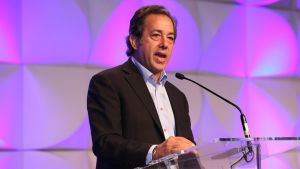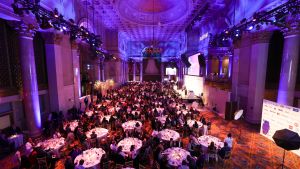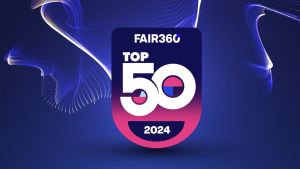To Our Partners and Clients:
We have decided to change the date and venue for our Top 50 event this year. It will be on May 13 from 10:30 a.m. to 7:30 p.m. at The Glasshouse, located at 49th St. and 12th Ave.
Given the political climate and overt attack on DEI efforts, I didn’t think it was prudent to plan for the same kind of turnout we’ve enjoyed in years past, but I do think this event is critical to the future of our collective work. The Glasshouse is well-equipped to facilitate our needed discussion on workplace fairness.
The theme of this year’s event is going to be about expressing what we do in the language of business. In my opinion, we must speak the language of top management and boards of directors. A recent column in Bloomberg called DEI and ESG a “luxury.”
We know DEI and ESG are not a luxury, but much of the language both subjects use is imprecise and relies on insider jargon, often with political overtones. Framing these ideas using business terminology—money saved, sustainability built, productivity and innovation increased, market perception improved, etc.—is essential to proving the relevance of DEI and ESG efforts.
People like Steven Miller, Elon Musk and Bill Ackman (who thinks Kyle Rittenhouse is a patriot) have been making quite a bit of noise about DEI discriminating against white men. We looked at our data and proved for an absolute fact that none of the companies we measure systemically discriminate against white men. In fact, our analysis showed that no white men were systemically hurt by DEI efforts. We may feel that’s intuitive, but not everybody else does, so communicating this reality is something that we must master.
As we documented in our article , 75% of senior executives at large corporations are white men, while only 19% of college graduates in 2023 were cis-gendered white men with no disabilities. Human capital management is evolving, but is it evolving quickly enough? That measurement is Fair360’s job.
Only 48% of people who graduated with a master’s degree in 1990 (making them old enough to be senior executive managers today) were men. What happened to the other 27 percentage points? Simply put, senior executive management does not have the quality it could have had if human capital management had led corporations to be fair. Again, measuring the techniques that the best companies have utilized to be more fair is Fair360’s job.
We have to change, too. We will start by including a fairness index that includes white men in our benchmark report and report card, which is evolving. We will also measure how white men are an integral part of providing fairness and equality to all.
The far right has leveraged a misperception to garner votes. For example, after a wheel fell off of an Alaska Airlines jet, Donald Trump, Jr. sarcastically posted, “I’m sure this has nothing to do with mandated diversity, equity and inclusion practices in the airline industry!!!”
It doesn’t.
Considering only slightly more than half of aircraft mechanics are white, if the airline industry does not conscientiously and thoroughly measure the fairness of its hiring practices, there’s no way they can get the best mechanics.
The simple truth is that you cannot have quality without diversity. But as hundreds of companies that made grand pronouncements after George Floyd’s murder proved, it’s not enough to have good intentions. You can’t just hire for diversity at an organization that has historically excluded diversity without changing the culture. That culture change is done the same way everything else is done in business: with metrics-based benchmarks and accountability for results.
Our event on May 13 will be the beginning of a new dialogue. I hope to see you there.







